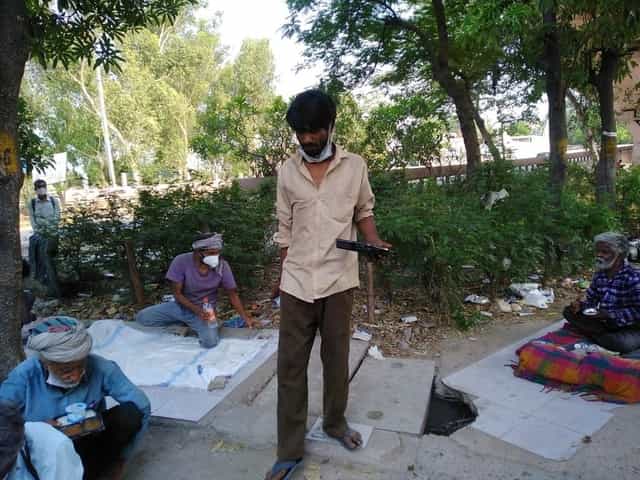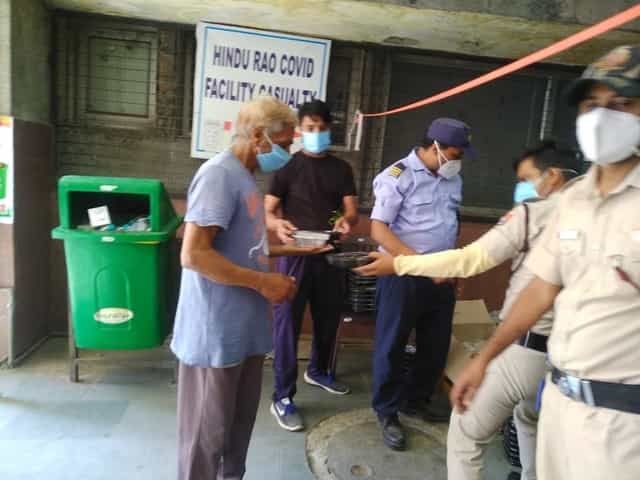The pavement is gold, lined by a carpet of banana peels left behind by the fruit fed by the pious to the little army of monkeys living in the North Delhi ridge. At the top of the road, some two hundred patients are being treated inside the fetid bowels of Bara Hindu Rao’s COVID-19 ward. The patients, and family members waiting outside, must rely on the overstretched resources of the municipal hospital, operated by staff who have continued working though some, themselves are ill. Later, stocks of khichri and bottled water trickle in, rustled up by local volunteers; there’s never enough. Authorities admit 23 patients have disappeared; no one is entirely certain where they might have ended up. Perhaps they found a better hospital somewhere else; perhaps they just thought they’d be better off at home. [caption id=“attachment_9613851” align=“alignnone” width=“640”]  At the Nigambodh Ghat crematorium in Delhi, families and workers queuing up for food. Firstpost[/caption] In 1918 when the Great Influenza tore through Delhi, killing hundreds of thousands in the city, and millions across India, Hindu Rao Hospital was a small convalescent centre for colonial officials. No record survives of how many it treated, nor whom. Even less is known of the residents of crowded Pul Bangash and Tis Hazari and the old Sabzi Mandi, who would have died in colossal numbers. There is, however, an Ashokan Pillar, installed by Emperor Firuz Shah, and a memorial to British troops killed in the great rebellion of 1857. History only records things that matter. The hideous suffering of the people who live around Hindu Rao didn’t matter to anyone other than them in 1918-1919; it still doesn’t matter a great deal now. The khaki uniforms of the Rashtriya Swayamsevak Sangh; the white peaked caps of the Aam Admi Party; the neat white uniforms of the Congress Seva Dal: these have not been seen around Hindu Rao in these weeks. A group of local activists from a political party did arrive once, in response to an emergency appeal, with packets of biscuits and Frooti. They proceeded to take selfies documenting themselves with patients and their families. Even a self-serving vain act of kindness, though, is better than none. It isn’t hard to see who is working, if someone troubles themselves to see: doctors, many of whom took a pay-cut last year; hospital staff, some of whom are ill with Covid themselves; young Civil Defence volunteers, paid an allowance of a few hundred rupees; police; municipal garbage and sanitation workers. Inside Hindu Rao, Kavita Rai, pushed to breaking point with her housekeeping duties, has added on food and water distribution to her responsibilities. [caption id=“attachment_9613891” align=“alignnone” width=“640”]  Civil Defence volunteers (in uniform) distributing food at the Hindu Rao Covid ward. Firstpost[/caption] From within the community, too, many heroes have emerged. There’s Sandeep Sharma, who runs a small Halwai business in Sitaram Bazaar, and is now catering 250 meals a day to patients in Hindu Rao and their families. He got to work before funding was fully organised, saying he’d accept whatever payment a volunteer group could organise. Parith Goel, “Cheenu” to his friends, supplies water; “tension mat lo; paisey-waisey ka ho jayega”. Ravinder Bhatia, a Coca-Cola executive, organised a week’s worth of water for hospitals and the swelling crowd at the Nigambodh Ghat crematorium. Ankit Gupta, a local poet, has spent the last year delivering sacks of grain across the city; now, he steps in to make sure kids at two North Delhi orphanages are fed. Soldiers are trained, and armed, and paid. These people aren’t. They deserve a medal from a grateful nation, but no one is around to bear witness to their war. The dregs of human behaviour are also on display, though, and not just from criminals black-marketing live-saving drugs. Élite families with no one suffering any illness have hoarded oxygen cylinders; well-known politicians, journalists and academics have pulled strings to get their own hospital beds at top hospitals. Great crises have always been the natural habitat of the black-marketer and the gangster; now, everyone with the means has reduced themselves to criminals. Each one has their reasons; each one is also guilty of murder. Élite city residents aren’t the only ones to show savagery: kicking down, like sucking up, are hallowed elements of our culture. At a North Delhi hospital where water cartons are being delivered, the private security guards begin bullying the driver and volunteers; not one steps in to help with unloading. Even the families of patients, leave aside bystanders, rarely step up to help unload and distribute supplies; labour is someone else’s assigned role. Imagining that the food and water being distributed must have a price, the poor at Hindu Rao or the Nigambodh Ghat crematorium wait, watching; it takes little many words to convince Delhi’s poorest that what has been brought is for them. In India’s capital, it’s hard for anyone to believe that some things don’t have a price and that not all strangers are out to rob them. Elsewhere, in the villages and towns around Delhi, things are worse. A truck driver who has brought the supplies donated by Coca-Cola tells of relatives in Uttar Pradesh who are dying, with no access to medicine or a doctor, let alone a hospital bed. It’s hard to know what he makes of the cartons of bottled water he’s just unloaded at Hindu Rao. This is the culture of power in India; it will shape what comes next. “Efforts were made to protect the European enclaves cantonments, civil lines and the hill stations from epidemics”, historian Sasha Tandon has recorded of the epidemics which claimed millions of lives in colonial India. As for the rest: “the rural poor, uprooted from their homes and hearths were left exposed to harsh conditions”; many died in internment camps, lacking food and water. To everyone who matters in Delhi is, their own selves are perhaps the most significant victim of this unfolding catastrophe: the word “us” and “we” have meaning only up to our front door. It’s possible we will simply accept this crime unfolding on our streets and in our communities. The great naturalist and hunter Jim Corbett mentioned, in The Man Eaters of Kumaon, “the mysterious disease which swept through India in 1918 and was called ‘war fever’”. Hill villagers, he recorded, died in greater numbers than could be cremated; instead, there was only “a very simple rite which consisted of placing a live coal in the mouth of the deceased, and the body is then carried to the edge of the hill, and cast into the valley below”. No one rebelled, no one complained. The leopards feasted, and turned man-eaters; the villagers kept sending their sons to fight for the British Army. This time, the rich have suffered, too—but in months to come, they will insulate themselves, with private-sector vaccines and expanded hospital care. They will survive. The poor won’t. And there will always be fresh bananas for the monkeys.
To everyone who matters in Delhi is, their own selves are perhaps the most significant victim of this unfolding catastrophe: the word “us” and “we” have meaning only up to our front door
Advertisement
End of Article


)

)
)
)
)
)
)
)
)



